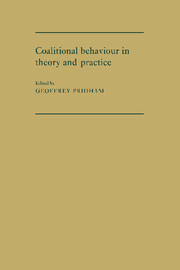Book contents
- Frontmatter
- Contents
- List of illustrations
- List of tables
- Notes on the contributors
- Preface
- 1 An inductive theoretical framework for coalitional behaviour: political parties in multi-dimensional perspective in Western Europe
- 2 Between theoretical elegance and political reality: deductive models and cabinet coalitions in Europe
- 3 Changing coalitional preferences among West German parties
- 4 The FDP and coalitional behaviour in the Federal Republic of Germany: multi-dimensional perspectives on the role of a pivotal party
- 5 Cabinet stability in the French Fourth Republic: the Ramadier coalition government of 1947
- 6 Coalition formation and maintenance in Belgium: a case-study of elite behaviour and changing cleavage structure, 1965–1981
- 7 The Dutch Christian Democratic party and coalitional behaviour in the Netherlands: a pivotal party in the face of depillarisation
- 8 Coalition or Fianna Fail? The politics of inter-party government in Ireland
- 9 Italy's party democracy and coalitional behaviour: a case-study in multi-dimensionality
- 10 Party coalitions in the first democratic period in Spain, 1977–1982
- 11 Coalitional theory and practice in Scandinavia
- 12 Multi-dimensional approaches to the study of local coalitions: some cross-national comparisons
- 13 Research notes
- Index
12 - Multi-dimensional approaches to the study of local coalitions: some cross-national comparisons
Published online by Cambridge University Press: 05 November 2011
- Frontmatter
- Contents
- List of illustrations
- List of tables
- Notes on the contributors
- Preface
- 1 An inductive theoretical framework for coalitional behaviour: political parties in multi-dimensional perspective in Western Europe
- 2 Between theoretical elegance and political reality: deductive models and cabinet coalitions in Europe
- 3 Changing coalitional preferences among West German parties
- 4 The FDP and coalitional behaviour in the Federal Republic of Germany: multi-dimensional perspectives on the role of a pivotal party
- 5 Cabinet stability in the French Fourth Republic: the Ramadier coalition government of 1947
- 6 Coalition formation and maintenance in Belgium: a case-study of elite behaviour and changing cleavage structure, 1965–1981
- 7 The Dutch Christian Democratic party and coalitional behaviour in the Netherlands: a pivotal party in the face of depillarisation
- 8 Coalition or Fianna Fail? The politics of inter-party government in Ireland
- 9 Italy's party democracy and coalitional behaviour: a case-study in multi-dimensionality
- 10 Party coalitions in the first democratic period in Spain, 1977–1982
- 11 Coalitional theory and practice in Scandinavia
- 12 Multi-dimensional approaches to the study of local coalitions: some cross-national comparisons
- 13 Research notes
- Index
Summary
Prospects and pitfalls of studying local coalitions
Any general theory of coalitions should help our understanding of coalitional behaviour at all levels, but traditionally most studies have focussed on national coalitions. In contrast, sub-national coalitions have attracted far less public and academic attention, but are equally important for understanding the nature of coalitional behaviour. There are numerically many more opportunities for studying inter-party agreements at the local level than there are at national level, and, by using the local context, it is possible to examine a number of coalitions simultaneously within a single country. Moreover, the study of local coalitions means that we emphasise intra-party relationships among the factors which may influence coalitional behaviour, and therefore no longer automatically view the party as a unitary actor.
A major criticism of traditional coalition theories has been their tendency to look upon political parties as unitary actors, each making rational calculations about the utility of coalition formation. To some extent, this tendency is the result of borrowing and adapting assumptions from earlier socio-psychological and game theory approaches to coalitions where the actor was believed to be both rational and single-minded. In political life, the coalition actor, the political party, does not possess the perfect knowledge and foresight which are prerequisites of rationality and is generally much less single-minded: intra-party conflict is frequently as fierce as inter-party rivalry.
- Type
- Chapter
- Information
- Coalitional Behaviour in Theory and PracticeAn Inductive Model for Western Europe, pp. 278 - 295Publisher: Cambridge University PressPrint publication year: 1986
- 4
- Cited by

